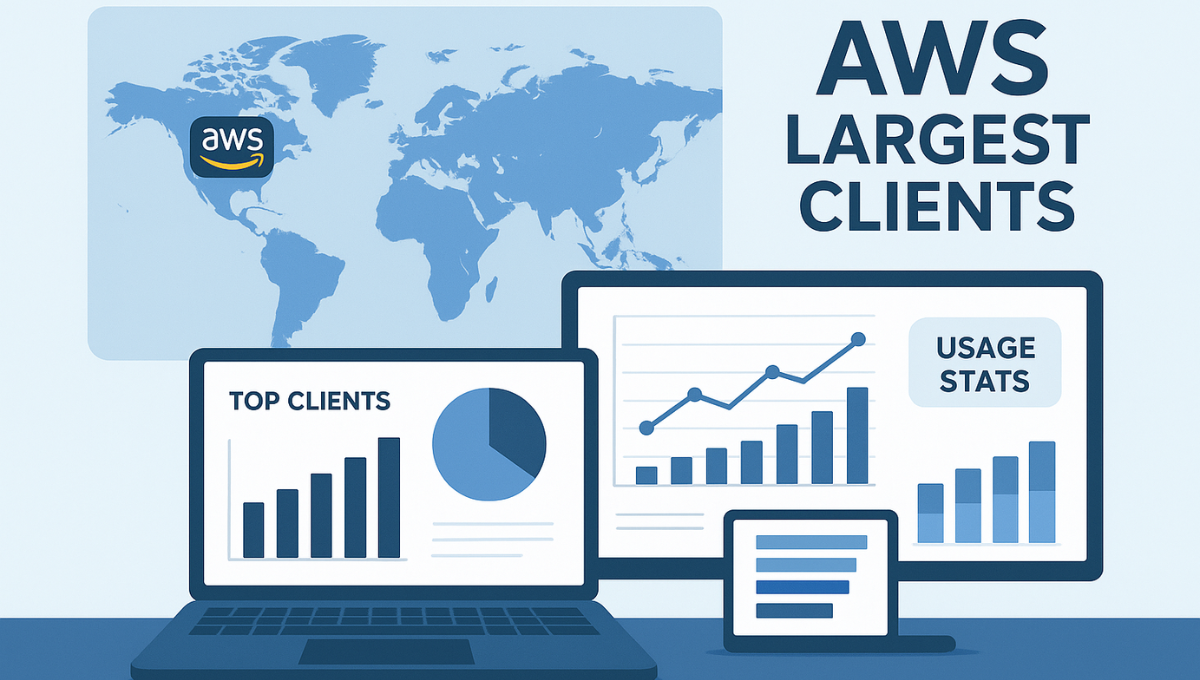- +1 (669)-293-6007
- reach@techdatapark.com
- 3080 Olcott St D205, Santa Clara, CA 95054, United States

In today’s fast-paced digital world, businesses are no longer bound by the limitations of on-premises infrastructure. The cloud has revolutionized the way companies operate, innovate, and scale and at the heart of this transformation is Amazon Web Services (AWS). As the world’s leading cloud platform, AWS powers everything from streaming services like Netflix to the real-time communication tools we use at work, such as Slack. But why do some of the biggest names in tech, retail, media, and finance trust AWS for their most critical operations?
In this blog, we’ll explore the major companies using AWS and dive into how this cloud giant helps them grow, scale, and stay ahead of the competition. Ready to discover how AWS is shaping the future of business? Let’s dive in!
Amazon Web Services (AWS) is a comprehensive and widely adopted cloud platform offered by Amazon. Launched in 2006, AWS provides a suite of cloud computing services, including computing power, storage, databases, networking, machine learning, analytics, and more. Businesses of all sizes use AWS to run applications, store data, and scale their operations without needing to manage on-premises hardware.
AWS is known for its flexibility, scalability, and cost-efficiency. It offers pay-as-you-go pricing, which means businesses can scale their infrastructure according to demand and only pay for the resources they use. This has made AWS one of the leading cloud service providers in the world.
Many high-profile companies across a wide range of industries rely on AWS for their cloud infrastructure. Some of the most notable companies leveraging AWS to drive innovation and business growth include:
Netflix is one of the largest streaming platforms in the world, and it relies heavily on AWS to support its vast and global infrastructure. AWS helps Netflix deliver millions of hours of content to users across the globe. By using AWS services such as EC2 (Elastic Compute Cloud) for computing power and S3 (Simple Storage Service) for storage, Netflix can scale its infrastructure seamlessly to handle varying levels of demand.
Why Netflix Chooses AWS:
Airbnb, the popular online marketplace for lodging and travel experiences, uses AWS to power its platform’s global reach. AWS provides Airbnb with the ability to scale its services as needed, ensuring a seamless experience for users booking or listing properties. The company uses AWS for services such as EC2, Lambda (for serverless computing), and RDS (Relational Database Service).
Why Airbnb Chooses AWS:
Slack, the communication platform for teams, uses AWS to manage its messaging services and real-time collaboration tools. By using AWS, Slack is able to deliver consistent performance, rapid scalability, and reliability, which are crucial for its millions of users across the globe.
Why Slack Chooses AWS:
Spotify, a leader in music streaming, uses AWS for its cloud infrastructure. AWS provides the scale and flexibility needed to store massive music libraries, serve millions of users, and analyze user behavior to improve the music recommendation engine. The company leverages AWS services like S3, EC2, and DynamoDB to power its platform.
Why Spotify Chooses AWS:
Pinterest, the image sharing and social media platform, relies on AWS for its cloud infrastructure. By using AWS, Pinterest can handle large amounts of image data, manage user-generated content, and support the continuous growth of its platform. The company uses services like EC2, S3, and Redshift to manage storage, computing, and analytics.
Why Pinterest Chooses AWS:
Expedia, a leading online travel agency, uses AWS to power its global platform. The company relies on AWS for computing resources, storage, and networking services to support its vast inventory of travel products. AWS enables Expedia to offer personalized travel recommendations and provide a seamless booking experience to its customers.
Why Expedia Chooses AWS:
Adobe, the software company known for products like Photoshop, Illustrator, and Acrobat, uses AWS to support its cloud-based solutions like Adobe Creative Cloud and Adobe Document Cloud. By leveraging AWS, Adobe can scale its services and offer its customers seamless access to tools and resources on-demand.
Why Adobe Chooses AWS:
GE, the multinational conglomerate, uses AWS to drive its digital transformation initiatives. The company uses AWS for industrial IoT (Internet of Things) applications, big data analytics, and machine learning to optimize operations, monitor equipment, and predict maintenance needs in real-time.
Why GE Chooses AWS:
Comcast, the telecommunications giant, uses AWS to support its cloud-based applications and services. AWS helps Comcast scale its infrastructure and improve the reliability and performance of its digital products, including streaming services, mobile apps, and online customer support.
Why Comcast Chooses AWS:
BMW, the German automotive company, uses AWS to enhance its connected car and smart vehicle technologies. By using AWS, BMW can process real-time data from vehicles, improve driver experiences, and optimize operations across its global network of dealerships and manufacturing facilities.
Why BMW Chooses AWS:
Many companies are using AWS because it provides a wide range of benefits that can help them grow and innovate in the cloud. Some of the key benefits include:
AWS allows businesses to scale their infrastructure up or down based on demand. This flexibility is crucial for companies that experience fluctuating traffic or seasonal spikes. AWS makes it easy to add or remove resources, ensuring companies only pay for what they use.
AWS operates on a pay-as-you-go model, which means businesses are not locked into long-term contracts or upfront costs. This model helps businesses save on IT infrastructure and maintenance costs, allowing them to allocate resources to other areas of growth.
AWS has a global network of data centers in multiple regions around the world. This enables businesses to deploy applications closer to their customers, reducing latency and improving performance. AWS’s global infrastructure also ensures that services remain available even if there is an issue in one region.
AWS provides a secure cloud environment with multiple layers of protection. It complies with a wide range of industry standards and certifications, such as GDPR, HIPAA, and ISO 27001. Businesses can trust AWS to keep their data secure and comply with regulatory requirements.
AWS helps businesses innovate faster by offering a wide variety of services, including artificial intelligence, machine learning, and big data analytics. These tools enable companies to experiment, build new products, and improve existing ones with greater speed and efficiency.
AWS is known for its reliability and uptime. With multiple Availability Zones and a track record of minimal downtime, businesses can trust that their applications and services will remain available to users around the clock.
Companies are using AWS to stay ahead in an increasingly digital world. AWS is a powerful cloud platform that has become a go-to solution for businesses looking to scale their operations, cut costs, and innovate faster. With companies like Netflix, Airbnb, Spotify, and BMW relying on AWS for their cloud infrastructure, it’s clear that AWS is a trusted partner for businesses of all sizes and industries.
As more companies continue to adopt cloud technologies, AWS’s ability to provide scalable, cost-effective, and secure solutions will keep it at the forefront of the cloud computing industry. Whether you’re a startup or a large enterprise, AWS, along with partners like TechDataPark, can offer the tools and services you need to stay competitive in the digital age.
AWS (Amazon Web Services) is a cloud computing platform offering a wide range of services like computing power, storage, and machine learning. It allows businesses to scale quickly and efficiently, paying only for the resources they use.
Top companies using AWS include Netflix, Airbnb, Spotify, Slack, and Pinterest. These businesses rely on AWS for scalable infrastructure, secure storage, and performance optimization to serve millions of users globally.
Companies choose AWS for its flexibility, scalability, cost-effectiveness, and robust security. It offers a broad range of tools and services, making it an ideal solution for businesses looking to innovate and scale quickly.
AWS supports business growth by providing scalable cloud infrastructure, which adapts to traffic fluctuations. It reduces upfront costs, enhances security, and speeds up the time-to-market for new services, fostering innovation and operational efficiency.
There are many providers offering AWS services but TechDataPark is a trusted partner for businesses looking to purchase AWS solutions. They offer tailored consulting, cloud migration services, and AWS management, ensuring a smooth and cost-effective deployment.
AWS is highly secure, offering multiple layers of protection, encryption, and compliance with industry standards like GDPR and CAN-SPAM. It ensures businesses can protect sensitive data while complying with regulations.
AWS offers cost savings, high availability, scalability, robust security, and the ability to quickly deploy applications. These benefits help businesses stay agile, meet customer demands, and reduce infrastructure costs.

Mark Felix brings a unique blend of tech expertise and marketing know-how to his role at TechDataPark. With a background in data analytics and technology marketing, Mark is skilled at helping businesses leverage targeted tech users lists to expand their reach and drive conversions. His data-driven approach enables him to craft compelling marketing strategies that resonate with tech audiences. Outside of work, Mark enjoys staying on top of cutting-edge technology trends and exploring how data continues to transform the marketing landscape.

How to Identify and Understand AWS’s Largest Clients In today’s cloud-driven world, knowing which companies rely heavily on Amazon Web Services offers more than curiosity—it provides strategic insight for cloud

How B2B Technographic Data Platform Boost ABM Campaigns in Australia? In Australia’s fast-moving B2B market, grabbing the attention of key accounts isn’t just about clever ads or catchy emails; it’s

How to Maximize Your Cloud Marketing ROI with AWS Users Email List In today’s fast-paced digital economy, businesses are rapidly moving to the cloud, with Amazon Web Services (AWS) leading